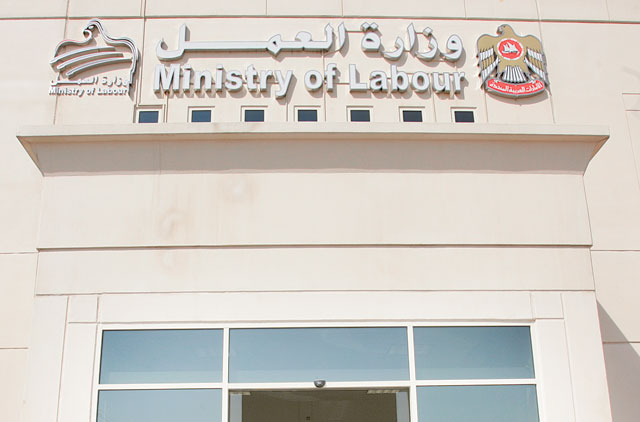Dubai: President His Highness Sheikh Khalifa bin Zayed Al Nahyan has issued Federal Decree-Law No 33 of 2021, regulating labour relations. Its articles will apply from February 2, 2022, to all establishments, employers and workers in the country’s private sector.
From granting of paternity leave to exemption of legal fees in labour disputes, the new decree-law offers host of benefits to workers in the private sector.
Federal Law No 8 of 1980 on the regulation of employment relations is scheduled to end from the date the new decree-law comes into effect.
Dr Abdul Rahman Al Awar, Minister of Human Resources and Emiratisation, said that the decree-law is the largest update in the law regulating labour relations in the UAE, in preparation for the next 50 years, through a system of future laws and legislations that respond to the requirements of this important stage in the history of the country and to optimally deal with the changes that the world of work is witnessing.
He added that the preparation of the new law was carried out in consultation with all parties concerned in the federal and local government sectors and the private sector.
Ensuring efficiency, attracting talent
During a media briefing held today to announce the Federal Decree-Law No 33 of 2021, regarding the regulation of labour relations, Al Awar explained that the new law aims to ensure efficiency in the labour market and also attract and preserve the best talents and skills for employment, in tandem with providing a stimulating and attractive work environment for employees.
He affirmed the law’s support for efforts to enhance the competitiveness of Emirati cadres in the labour market, as well as empower women.
Ease of doing business
He said that the decree-law aims to enhance the flexibility and sustainability of the labour market in the country, as it guarantees the protection of the work relationship, its developments and the exceptional circumstances it may face.
Al Awar stressed that the new law has created an advanced mechanism that will enhance ease of doing business, competitiveness and productivity of the labour market. He said that the decree-law guarantees the rights of both the employer and the employee in a balanced manner and provides protection for both the parties so that they can claim these rights as and when necessary.
He pointed out that the new law supports the stability and wellbeing of workers in the private sector and emphasises international labour obligations agreed upon by the UAE.
Keeping pace with current and future developments
In response to questions from media representatives, the minister said that the executive regulations are currently being prepared to regulate implementation of the provisions of the decree-law, explaining that the decree gives flexibility to the Council of Ministers by granting it a package of competencies that will keep pace with current and future developments.
He said that the Ministry of Human Resources and Emiratisation will work on proposing policies, strategies and legislations to encourage and motivate enterprises to invest in training and empower workers, raise their skill-sets, efficiency and productivity, adopt modern technologies and attract the best talents according to the requirements of the labour market in the country, as well as train students of public and higher-education institutions accredited in the state.
Major provisions/stipulations under the new decree-law:
Prohibition of all forms of coercion at the workplace
Article 74 of the decree-law stipulates that the employer may not use any means that would force the worker or threaten him or her with any penalty or force him or her to work for the employer or force him or her to provide a service against his or her will.
Prohibition of sexual harassment
The new decree-law prohibits sexual harassment, bullying or any form of verbal, physical or psychological violence against a worker by the employer, his or her superiors at work or colleagues.
Prohibition of discrimination and prejudice
The law prohibits all forms of discriminations based on race, colour, sex, religion, national origin, social origin or disability among persons that would weaken possibilities of equal opportunity, prejudice equal access to or continuation of employment and enjoyment of rights.
Equal pay for men and women
The amendments stressed that while not violating the prescribed rights of working women stipulated in this decree, all provisions governing the employment of workers without discrimination shall apply to women, with emphasis on granting women the same wage as men if they are doing the same work or work of equal value, which will be determined by a decision of the Council of Ministers.
Enhancing ease of business and labour market flexibility
Among the most prominent amendments in the new law is the introduction of new types of work to allow employers to meet their labour requirements and benefit from their energies and productivity at the lowest operational cost through part-time work, temporary work and flexible work, as well as allow employers to employ workers whose work contracts have expired, but who are still in the country, through easy and flexible procedures.
Defining part-time, temporary and flexible work
Part-time work allows work for an employer for a specified number of hours or days. Temporary work is work whose implementation requires a specified period of time or is focused on work that ends with completion of a specified job. Flexible work is work for which working hours or work days change according to the volume of work and economic and operational variables of the employer.
The executive regulation of the law will specify the conditions and control of work patterns and the obligations arising from each worker and employer, depending upon the type of employment — including what is related to end-of-service gratuity and as required by the interest of the two parties to the work contract.
Payment of wages in any currency
The law grants companies the flexibility to pay wages in UAE dirhams or in any other currency, according to the agreement between the two parties in the work contract.
Non-disclosure and noncompetitive clause
The decree-law also permits the employer to prohibit the worker from competing with the employer or participate in any competing project in the same sector, if the work entrusted to the worker allows him or her to know the employer’s clients or access his or her trade secrets — provided that the condition is specified in terms of time, place and type of work to the extent necessary to protect legitimate business interests and the period of noncompetition shall not exceed two years from the date of contract expiry.
Fixed-term contracts and Unlimited contracts defined
The decree-law specifies fixed-term contract (Limited) as one not exceeding three years, and it is permissible, by agreement between the two parties, to extend or renew this contract for a similar or lesser duration once or more.
The provisions of the decree-law shall apply to employment contracts of indefinite duration concluded in accordance with Federal Law No (8) of 1980.
The law also states that Unlimited employment contracts are to be converted into fixed-term employment contracts, in accordance with the conditions, controls and procedures contained in this decree by law, within one year of the effective date of the existing contract and may be extended by the Council of Ministers for further periods as required in public interest.
Worker welfare at the core
The new decree-law has the idea of worker welfare and wellbeing at its core. In keeping with that, a host of measures have been provided to ensure a safe and healthy work environment to all employees in the private sector.
Here is a look at what the new decree-law guarantees towards this objective:
Rest days, paternity leaves and more
All private sector workers are entitled to a paid, weekly rest day, with the possibility of increasing the weekly rest day at the discretion of the establishment, in addition to providing vacations for the workers, including mourning leave ranging from three-five days, according to the degree of the employee’s relationship with the deceased. In addition, paternity leave of five days to be granted to private sector workers. Any other leave to be decided by the Council of Ministers.
The law also assigns the employer the responsibility to bear the fees and cost of recruitment and not to collect the same from the worker either directly or indirectly.
No withholding of documents, employee’s ease of movement
The law stipulates the prohibition of withholding of official documents, such as passports, belonging to the workers and forcing him or her to leave the country at the end of an employment contract. This has been done to allow the worker to move to another establishment in the labour market. The worker shall also have the right to obtain his or her wages on the due date in accordance with the regulations approved by the ministry and according to the conditions and procedures as specified by the Executive Regulations of this decree-law.

The decree-law permits the worker, in the event of termination of the work contract, to move to another employer. Also, probationary period for the worker must not exceed six months.
End-of-service benefits defined
The amendments include a provision, according to which, a worker is entitled to an end-of-service gratuity, in accordance with the legislation regulating pensions and social security in the country.
It also stresses that eligibility of a foreign worker who has worked full-time and who has completed one year or more of continuous service with an establishment, shall be paid end-of-service benefits calculated according to the basic wage, with a wage of 21 days for each of the first five years of service and a wage of 30 days for each subsequent year.
Exemption of workers from paying litigation fees
The decree-law exempts labour cases from judicial fees in all stages of litigation, execution and requests made by workers or their heirs, the value of which does not exceed Dh100,000.
New law also states clearly what the worker is expected to do
Rights and obligations of the worker
The new law regulates the obligations of the employer, the most prominent of which is the establishment of labour regulations, the obligation to provide adequate housing, as well as train workers and help them develop their skills.
On the other hand, the law also regulates the workers’ obligations based on the terms of the employment contract and in accordance with duties, including performing work during the specified times, adhering to good conduct and ethics, preserving work secrets, seeking to develop job skills, committing not to work for another competing employer, vacating the labour accommodation within one month of expiry of employment contract and other obligations.
A sum-up of all that the new decree-law guarantees and safeguards
- The decree is the biggest update in the law regulating labour relations, ensuring the efficiency of the labour market and enhancing its flexibility and competitiveness through an advanced mechanism.
- Achieving ease of business and investing local and global energies and talents.
- Ensuring the rights of both parties to a work relationship in a balanced manner and providing protection to both.
- Enhancing the competitiveness of Emirati cadres in the labour market and empowering women
- Introducing flexible, temporary and partial work patterns.
- Introducing mourning and parenthood leave.
- Specific contracts for a period of three years can be extended or renewed by agreement between both parties.
- Prohibition of discrimination, bullying, verbal, physical and psychological violence against workers.









